Pope Francis wants YOU to be a missionary
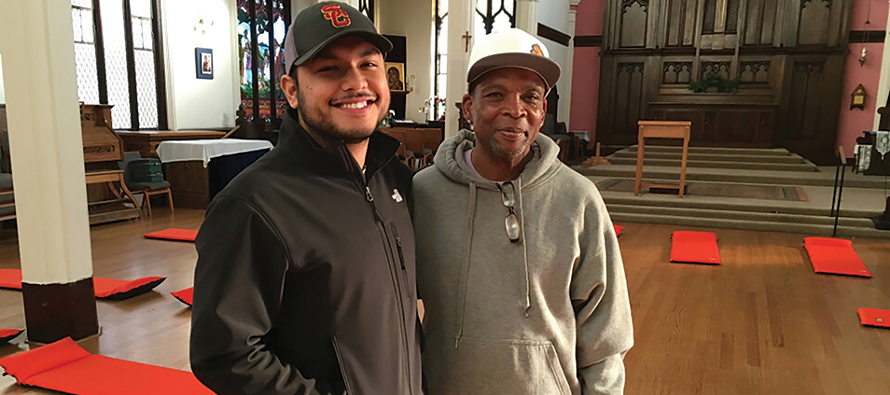
Image: To better serve the homeless, Jose Lopez (left) immersed himself in their world during a Vincentian Volunteer year in San Francisco. He did a “street retreat,” living without a home for a week. He is pictured here with a friend at St. Boniface Church in San Francisco, which is open daily to people without shelter.
When I was 12, an actual missionary came to speak to our class at St. Matthias School in Chicago. We had heard about missionaries, of course, but here in the flesh stood Father Raymond Cowell, a Chicago guy like us. He seemed old to me then, even though he was only in his 30s. He had spent the past 10 years in Bolivia, a place I knew about solely because of our 3-D map-making assignment on South America.
Father Cowell told us stories about the people of Bolivia and what he had learned from them. He gave us his address, and he and I corresponded a few times. What a kick it was, in those days before email, to get a letter from a real live missionary in a red, white, and blue airmail envelope.
Now, although Pope Francis might enjoy this back-in-the-day story, he would tell me that I got one thing wrong: my assumption that Father Cowell was a missionary and I was not. The pope isn’t letting me, or you, off the hook that easily.
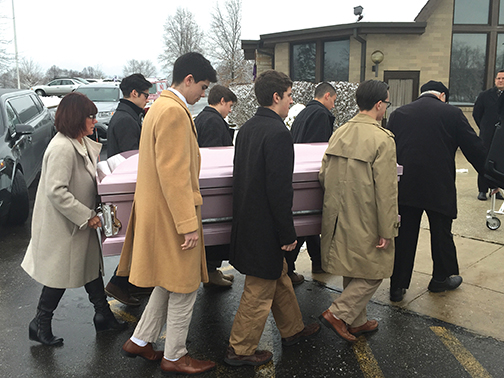
We’re all in charge of the gospel
Since before he was elected pope, Francis has insisted that simply because of our Baptism, each of us is called to be a missionary—wherever we happen to be, whatever we are doing with our lives. The pope says that Catholics can never just delegate the job of spreading the Good News to people such as Father Cowell and others who serve the church in far-off lands. It’s up to each of us to communicate what Pope Francis calls “the joy of the gospel” right where we are.
We might tell ourselves that we don’t have enough knowledge or free time or nerve to actually do this. A young and very wealthy Philadelphia heiress named Katharine Drexel probably had these same thoughts when she set out for her audience with Pope Leo XIII in 1887. When Drexel described for Pope Leo the great need for missionaries among the Native Americans and African Americans in the United States, the pope asked her, “What about you? What are you going to do?”
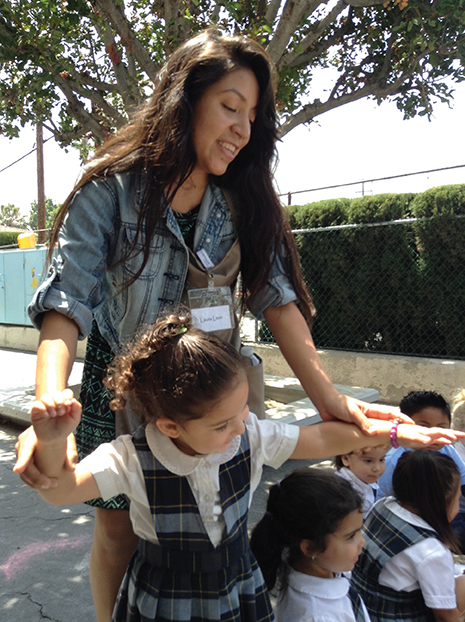
During his visit to the United States in 2015, Pope Francis used Drexel’s story and Pope Leo’s response to make a point. “Those words changed Katharine’s life,” Francis said, “because they reminded her that, in the end, every Christian man and woman, by virtue of Baptism, has received a mission. Each one of us has to respond, as best we can, to the Lord’s call to build up his Body, the church.”
Drexel, “a young women with high ideals,” realized, he said, “that she was being called upon to do her part. How many young people in our parishes and schools have the same high ideals, generosity of spirit, and love for Christ and the church!”
He’s right, of course. Examples abound of young people becoming missionaries right in their hometowns, giving of their time and energy to do the works of mercy in Christ’s name—feeding the hungry, clothing the naked, sheltering the homeless, visiting the sick and imprisoned, and burying the dead.
At St. Ignatius High School in Cleveland, for the past 14 years hundreds of juniors and seniors have volunteered to serve as pallbearers at the funerals of the homeless, the forgotten, or families who simply do not have anyone to help give their loved one a dignified burial. The students also gather twice yearly for a prayer service at Potter’s Field, the resting place of Cleveland’s indigent people. Jim Skerl, theology teacher and founder of the ministry, told radio journalist John Hockenberry that the purpose is “to bring our faith to the streets of Cleveland.” Because the young men serve on weekends, over the summer, and during school vacations, Skerl said, “our students really realize faith is supposed to be lived 24/7.”
Distance is relative
Pope Francis has challenged our church (in other words, all of us) to “go to the peripheries.” By this he means not only the far corners of the world, but the places in our own society where people are poor, forgotten, abandoned, voiceless. He has called for “a loving attentiveness to the poor,” which “entails appreciating the poor in their goodness, in their experience of life, in their culture, and in their ways of living the faith” (Evangelii Gaudium, sec. 199).
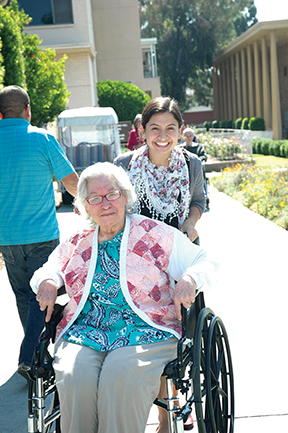
Jose Lopez, a recent graduate of DePaul University in Chicago, took these words to heart. After his 2014 graduation, he spent a year as a Vincentian Volunteer, working with the Gubbio Project at St. Boniface Church in San Francisco’s Tenderloin neighborhood. The church opens its doors during the day to provide a sacred space and sanctuary for homeless people, who are free to sleep in the pews. During his year of service, Lopez even went on a weeklong “street retreat,” in which he and others lived among people who are homeless, slept outside in a rainstorm, ate at soup kitchens, and experienced a bit of what those without homes endure every day. He found how hard it was, while living on the streets, to follow through on his plans to walk to a certain shelter on time or find a place to take a shower. “One of the major lessons I learned … is that the streets have their own schedule,” he wrote on his blog, which gave him great compassion for the homeless guests at the Gubbio Project.
Pope Francis encourages each of us to ask ourselves the question that Pope Leo asked of Katharine Drexel: “What about you? What are you going to do?” Living out our own call to mission may be less dramatic than Lopez’s experience of living with the homeless for a week. Perhaps it requires us to say something when an acquaintance tells a hateful or bigoted joke and everyone else is afraid to object. Or we could speak up for the voiceless in our society by contacting our politicians to advocate for more just treatment of people in poverty, minorities, immigrants, refugees, prisoners, the unborn, and others at the margins of society.
Perhaps we can make a point of reaching out to a friend who has lost a loved one or who is suffering another kind of loss. Often people in grief are greatly isolated because others hesitate to bring up the loss since they don’t know what to say. We can simply ask from the heart, “How are you really doing?” and give the grieving person a chance to respond.
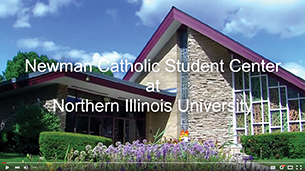
One way to live out Pope Francis’ call to mission is as a lay missionary. At Northern Illinois University's Newman Catholic Student Center some young people are creating Christian community and serving fellow students on a public university campus.
Briana Tobin is one of 20,000 students at Northern Illinois University in DeKalb, Illinois—and one of 5,000 Catholics on campus. She found a spiritual home away from home at the Newman Catholic Student Center, the college’s parish and a vibrant faith group of peers who worship, minister, educate, and promote peace and justice together.
“I was really drawn to the Newman Center because of the community here and how diverse it is ,” says Tobin, “and the opportunity I would have to serve the students and be on a really awesome team with other missionaries. It was inspiring to see, and I just really wanted to be a part of that.”
VISION met with Tobin and other members of the Newman mission team to learn about their activities and the good work they do. Check out our video at youtube.com/VisionVocationGuide.
We can bring our faith into our work choices as well. Annemarie Scobey in U.S. Catholic writes of a young Catholic lawyer whose clients sometimes ask him to do things that are technically legal but morally questionable. To this he says, “Yes, you can do that legally, but is it the right thing to do?” What a courageous response. Here’s a man living out his call to spread the gospel.
Sealed with soul
In his apostolic exhortation Evangelii Gaudium, the pope spoke with passion about the mission every Catholic is called to: “We have to regard ourselves as sealed, even branded, by this mission of bringing light, blessing, enlivening, raising up, healing and freeing. All around us we begin to see nurses with soul, teachers with soul, politicians with soul, people who have chosen deep down to be with others and for others” (sec. 273).
Above all Francis says that our sense of mission springs from not a dreary sense of burden or responsibility, but from our own joy at being showered by God’s love and mercy. We are called, he says, to be “joyful messengers of challenging proposals, guardians of the goodness and beauty which shine forth in a life of fidelity to the gospel” (Evangelii Gaudium, sec. 168).
Keep your options open
Pope Francis also encourages us to consider giving our lives to God as a priest, nun, or brother who witnesses to the faith far from home. While in Africa in 2015, he appealed to young people, “Please, don’t exclude this possibility of becoming missionaries, to bring love, faith, and humanity to other countries.” He spoke of how missionaries preach with their lives rather than by proselytizing: “Faith is preached first through witness, then with words—but slowly.”
Consider Father Cowell, who passed away in 2012 in Bolivia at age 82. I found that he was asked to make only a five-year commitment to serve in the missions and was then free to return to the United States. Instead of five, he spent 53 years as a missionary in South America. He was put in prison briefly during a military coup and he faced other difficulties, but a friend said these never slowed him down or changed his convictions. To use Pope Francis’ words, Father Cowell was one of those who joyfully “burn up their lives to announce Jesus Christ.”
Related article: vocationnetwork.org, “6 things Pope Francis wants you to know,” Vision 2015.
Tags
Related
- Questions Catholics Ask
- What Catholics believe about the Eucharist
- How Jesus embraced his call
- Prayer: Our never-ending conversation with God
- What the church is teaching—and learning—about the sin of racism
- Church defined: Jesus calls; we respond
- A Creed to believe in
- On whose authority?
- Ten great things about being Catholic
- Following Jesus: Be ready for some surprises Read More
Most Viewed
- Find your spirituality type quiz
- Questions and answers about religious vocations
- Celibacy quiz: Could I be a nun? Could I be a brother? Could I be a priest?
- Resources for older discerners or those with physical and developmental differences
- About Vocation Network and VISION Guide


